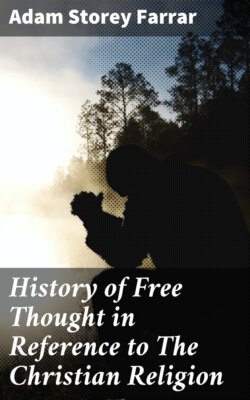History of Free Thought in Reference to The Christian Religion

Реклама. ООО «ЛитРес», ИНН: 7719571260.
Оглавление
Adam Storey Farrar. History of Free Thought in Reference to The Christian Religion
History of Free Thought in Reference to The Christian Religion
Table of Contents
Analysis of the lectures
Lecture I
Lecture II
Lecture III
Lecture IV
Lecture V
Lecture VI
Lecture VII
Lecture VIII
Lecture I. On The Subject, Method, And Purpose Of The Course Of Lectures
Lecture II. The Literary Opposition of Heathens Against Christianity in the Early Ages
Lecture III. Free Thought During The Middle Ages, and At The Renaissance; Together With Its Rise in Modern Times
Lecture IV. Deism in England Previous to A.D. 1760
Lecture V. Infidelity in France in the Eighteenth Century, and Unbelief in England Subsequent to 1760
Lecture VI. Free Thought In The Theology Of Germany From 1750–1835
Lecture VII. Free Thought: In Germany Subsequently To 1835; And In France During The Present Century
Lecture VIII. Free Thought in England in the Present Century; Summary of the Course of Lectures; Inferences in Reference to Present Dangers and Duties
Notes
Lecture I
Note 1. p. 3. Subdivisions Of Historical Inquiry
Note 2. p. 4. The Comparative Study Of Religions
Note 3. p. 4. Zend And Sanskrit Literature
Note 4. p. 12. The Controversy Between Christians And Jews
Note 5. p. 12. The Contest Of Christianity With Mahometanism
Note 6. p. 12. Unitarianism
Note 7. p. 24. Classification Of Metaphysical Inquiries
Note 8. p. 28. Quotation From Guizot On Prayer
Note 9. p. 31. On The Modern View Of The Historical Method In Philosophy
Lecture II
Note 10. p. 46. Neo-Platonism
Note 11. p. 47. The Pseudo-Clementine Literature
Note 12. p. 48. The Absence Of References To Christianity In Heathen Writers Of The Second Century
Note 13. p. 49. The Peregrinus Proteus Of Lucian
Note 14. p. 51. The Work Of Celsus
Note 15. p. 56. The Charges Against Christians, And Causes Of Persecution, In The Second Century
Note 16. p. 61. Modern Criticism On The Book Of Daniel
Note 17. p. 64. The Reply Of Eusebius To Hierocles
Note 18. p. 67. The Philopatris Of The Pseudo-Lucian
Note 19. p. 87. The Work Of Julian Against Christianity
Lecture III
Note 20. p. 89. On The Legendary Work, Entitled “De Tribus Impostoribus.”
Lecture IV
Note 21. p. 118. On Some Technical Terms In The History Of Unbelief
Note 22. p. 136. Woolston's Discourses On Miracles
Lecture V
Note 23. p. 178. The Literary Coteries Of Paris In The Eighteenth Century
Note 24. p. 198. The Term Ideology
Note 25. p. 195. The Works Of Dr. Geddes
Note 26. p. 196. The Works Of Conyers Middleton
Lecture VI
Note 27. p. 213. On Pietism In Germany In The Seventeenth Century
Note 28. p. 224. Classification Of Schools Of Poetry In Germany
Note 29. p. 225. The Wolfenbüttel Fragments
Note 30. p. 242. Schleiermacher's Early Studies
Note 31. p. 244. Schleiermacher's Theological Works
Note 32. p. 252. On Some German Critical Theologians. (de Wette, Ewald, Etc.)
Note 33. p. 255. The Name Jehovah
Note 34. p. 256. The Use Of The Names Of Deity In The Composition Of Hebrew Proper Names
Lecture VII
Note 35. p. 264. The Hegelian Philosophy
Note 36. p. 271. The Christology Of Strauss
Note 37. p. 278. Strauss
Note 38. p. 273. The Replies To Strauss
Note 39. p. 278. The Tubingen School
Note 40. p. 281. The German Theologian Rothe
Note 41. p. 285. The Most Modern Schools Of Philosophy And Theology In Germany
Note 43. p. 289. The Modern Theology Of Switzerland And Holland
Note 44. p. 297. The Eclectic School Of France
Note 45. p. 300. The Catholic Reactionary School Of France
Note 46. p. 304. The Modern School Of Free Thought In The Protestant Church Of France
Lecture VIII
Note 47. p. 320. Modern Opinions With Respect To Mythology
Note 48. p. 363. The External And Internal Branches Of Evidence
Note 49. p. 366. The History Of The Christian Evidences
Note 50. p. 373. On The History Of The Doctrine Of Inspiration
Index
Footnotes
Отрывок из книги
Adam Storey Farrar
Published by Good Press, 2020
.....
This is the third phase of free thought in that which was called the fourth crisis of faith.—Importance of the movement, which is called “rationalism,” as the theological phase of the literary movement of Germany (p. 210).—Deviation from the plan previously adopted, in that a sketch is here given of German theological inquiry generally, and not merely of unbelief (p. 211).
Brief preliminary sketch of German theology since the Reformation. Two great tendencies shown in it during the seventeenth century (p. 211).
.....